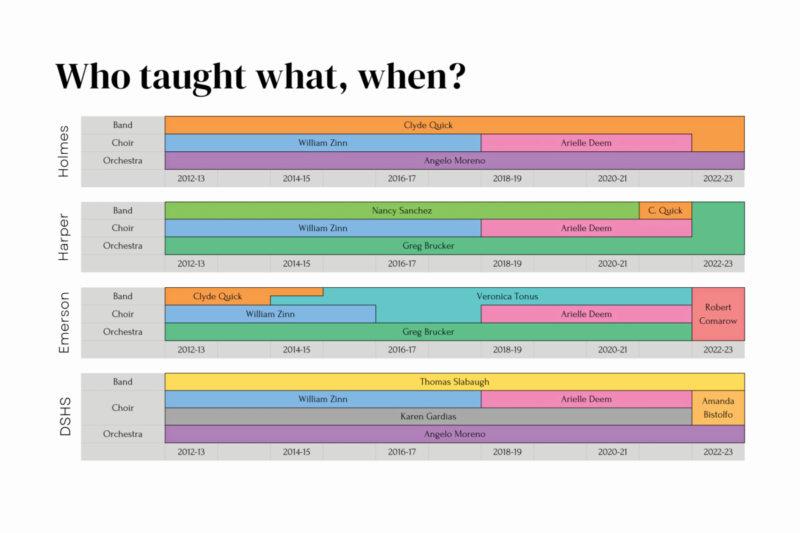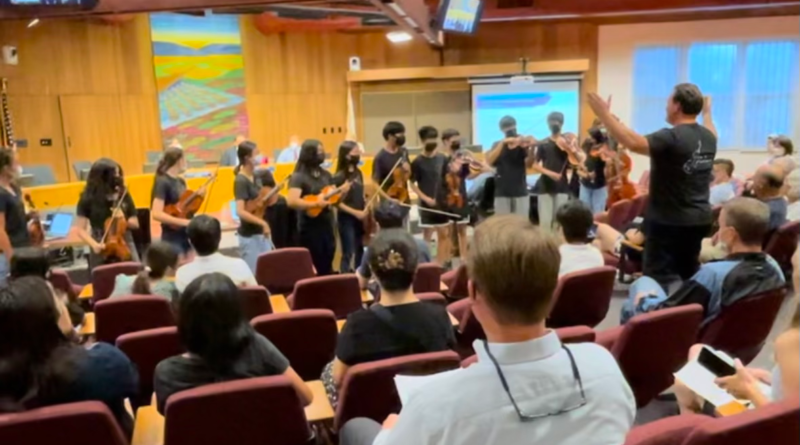Dissonance in DJUSD: Restructured music program prompts protests and rancor
COURTESY PHOTO/Drew Liu: DHS/Holmes orchestra director Angelo Moreno protested the restructuring of DJUSD music programs by organizing students to perform “The Star-Spangled Banner” at a June 16 board meeting.
By Elliot DeJong,
BlueDevilHUB.com Staff-
Maintaining the quality and quantity of choirs at junior high and high schools was the driving force for the restructuring of teaching positions in DJUSD music for the 2022-23 school year, according to Superintendent Matt Best.
The previous model was a “specialist” model, with separate teachers for band, orchestra, and choir. The new model at junior highs is a “generalist” model, with one person teaching all three music classes.
Rancor over the restructuring has grown to the point that some music teachers are forbidden from talking to each other without mediation by an administrator.
The original restructuring plan assigned Clyde Quick, Greg Brucker and Veronica Tonus to teach all music courses at their respective junior high school, with the exception of the Holmes orchestra, which would remain under the direction of Moreno.
Quick had previously taught primarily band; Brucker, orchestra; and Tonus, band.
“We were feeling pretty good, quite frankly, that these three teachers were like (…) ‘we’ll do what it takes to make this work,’” Superintendent Matt Best said.
How it all began
The impetus of the restructuring was William Zinn’s retirement in 2018. Zinn had been teaching choir full-time at DHS, Holmes and Harper since 2003 alongside Karen Gardias.
Zinn’s position was decreased to part-time after his retirement and a choir class at Emerson was added. Arielle Deem was hired to fill this role during the 2018-19 school year, traveling to four sites per day to teach four classes without the benefits of being a full-time teacher.
Best said Deem felt “burnt out” from traveling daily between school sites.
Quick, Tonus and Brucker had been aware of the strain Deem was feeling, and Best says they had been discussing potential solutions for a few years before the decision. A DJUSD announcement from June 2022 explained, “Mr. Brucker and Ms. Tonus volunteered… to implement a solution to the staffing challenge, by each teaching all music courses, for which they are credentialed to teach, at one site for the 2022-2023 school year.”
This new solution was implemented at the beginning of the 2022-23 school year with a reshuffling of music teachers.
Deem transitioned to teaching at Da Vinci High School and Tonus and Brucker planned to teach entirely at Emerson and Harper, respectively. Quick assumed directorship of the Holmes choir and band programs.
Gardias transitioned to serve as a DHS vice principal, with Amanda Bistolfo taking her position as DHS choir director.
Tonus, who originally intended to teach Emerson music courses for the 2022-23 school year, decided to leave the district in August. Quick dropped his role as DJUSD music coordinator.
Robert Comarow was hired in place of Tonus to teach Emerson music courses, and has been working with Quick and Brucker to develop curriculum and skill in unfamiliar fields.
What the teachers had to say
When the plan to implement the change was publicized, Moreno (DHS and Holmes orchestra) and Thomas Slabaugh (DHS band) emailed letters of discontent to their respective Davis High orchestra and band communities, criticizing the decision.
In his June 8 email, Moreno stated, “No music teachers, students, or parents that are being affected by these backwards changes were consulted in the decision-making process.” Slabaugh wrote on Oct. 22, that the music coordinator “had unilaterally made a decision to change our teaching assignments in the coming year and to change the educational model of how music services would be delivered district wide.”
Teachers involved in the decision-making process declined to comment, but district officials reiterated that the decision was made by all three junior high teachers.
Moreno was initially slated to be removed from his position as head of the Holmes orchestra program.
However, according to Best, the district has no authority to forcibly remove Moreno from his position at Holmes per the Davis Teachers’ Association contract. Even so, Moreno expressed feelings of duty to protest the “negative nonsensical direction”.
“When you spend your entire adult life sacrificing to build, improve, and maintain something of the great value, (…) you are called to stand and fight to protect that which is virtuous and under attack and being persecuted because it is the right thing to do, regardless of the political fallout,” Moreno wrote in the June 8 email.
Moreno was sent a list of talking points by a DJUSD administrator, which he forwarded to the DHS orchestra community. The orchestra community disagreed with these points, and protested the change at a DJUSD Board of Education meeting on June 16 by interrupting proceedings with a performance of “The Star-Spangled Banner.”
“I think the situation got quickly blown out of proportion for what had been a pretty simple contractual decision,” Best said.
“In hindsight, should we have notified the larger school community (…) that Mr. Brucker wasn’t going to teach orchestra at Emerson? Maybe,” Best said. “But I also think individual teachers’ rationale for their individual decisions isn’t necessarily district news. That’s a hard balance.”
Slabaugh did not publicly protest to the extent Moreno did, but published his opinion in an Oct. 22 memo sent out to DHS band students. He expressed a similar “responsibility (…) to be an advocate to the community,” disagreement with the removal of Jazz Band at Emerson and Harper and an emphasis on the disadvantages of a ‘generalist’ vs. ‘specialist’ model of class assignment.
Slabaugh noted that junior high teachers are no longer taking part in joint meetings and cross-site events like Pep Band.
Rancor grows
Slabaugh, Quick, Brucker, Tonus and Bistolfo were all contacted but declined to comment on the situation.
Slabaugh and Moreno are not currently permitted to contact the junior high teachers for any reason without a district intermediary per Board of Education Policy 4119.21.
“We expect all of our teachers to treat one another like professionals,” Best said. “When we are in circumstances where there’s conflict between people and folks can’t meet these standards, we’re going to limit their communication with each other.”
Overall, the total full-time equivalent of music teachers in DJUSD has only dropped from 9.8 to 9.7, the equivalent of half a class. According to Best, this is a normal level of annual fluctuation. Student enrollment in DHS performing arts classes hasn’t decreased, and Best says multiple years of significant decreases would have to happen before cutting a course.
“I don’t think there’s any evidence that there’s some nefarious plan to reduce music programming in the district,” Best said.
Moreno and Best both stated they believe the best avenue to a solution would be gathering all impacted staff to discuss the situation. Moreno made this request at the beginning of the year, but the meeting was delayed until at least next semester.
“When you put people in a room with common goals who are specialists (…) you get a think tank with positive outcomes for everyone involved,” Moreno said.
Slabaugh and Moreno’s preference for the specialist model is shared by Best and Allen, but neither thinks it is sustainable for DJUSD.
“In a teacher shortage and especially when we’re talking about music credentials (…) there’s just fewer (music teachers) in California, in Davis, with a specialty,” Allen said.
Best says that, though it will take time, he believes music teachers will grow and adapt to their new courseloads.
“My biggest fear is (…) the current climate in the music department… why would people want to work in that?” Best said.


